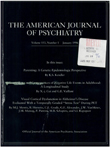Temperament and hypercortisolemia in depression
Abstract
OBJECTIVE: The authors examined the relationships among depression severity, melancholia, and cortisol level and the relationship between temperament, as measured with the Tridimensional Personality Questionnaire, and cortisol level. METHOD: Morning and afternoon cortisol levels of 40 healthy comparison subjects and 96 patients with major depression were measured. The depressed patients were rated for depression severity and melancholia, and they completed the Tridimensional Personality Questionnaire. RESULTS: Temperament, especially dependence and extravagance, but not depressive symptoms, was the major determinant of the hypercortisolemia observed in the depressed patients. CONCLUSIONS: For research in biological psychiatry to advance, more attention needs to be paid to the individual differences in biology that underlie any state-dependent biologic dysfunction.
Access content
To read the fulltext, please use one of the options below to sign in or purchase access.- Personal login
- Institutional Login
- Sign in via OpenAthens
- Register for access
-
Please login/register if you wish to pair your device and check access availability.
Not a subscriber?
PsychiatryOnline subscription options offer access to the DSM-5 library, books, journals, CME, and patient resources. This all-in-one virtual library provides psychiatrists and mental health professionals with key resources for diagnosis, treatment, research, and professional development.
Need more help? PsychiatryOnline Customer Service may be reached by emailing [email protected] or by calling 800-368-5777 (in the U.S.) or 703-907-7322 (outside the U.S.).



